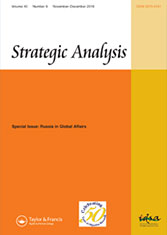Jinnah: His Successes, Failures and Role in History
More than seven decades after Pakistan’s creation, Mohammad Ali Jinnah continues to captivate both his critics and admirers. While the former excoriate him for exploiting religion to achieve his goal, the latter hail him as the Qaid-e-Azam (Great Leader) who single-handedly secured a homeland for the Muslims of British India.
- Amit Cowshish |
- May 2021 |
- Strategic Analysis





